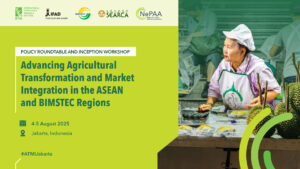The International Food Policy Research Institute (IFPRI), with support from the International Fund for Agricultural Development (IFAD) and in collaboration with the Southeast Asian Regional Center for Graduate Study and Research in Agriculture (SEARCA) and the Bay of Bengal Initiative for Multi-Sectoral Technical and Economic Cooperation (BIMSTEC), is organizing a regional workshop titled Policy Roundtable and Inception Workshop on Agricultural Transformation and Market Integration – Phase II (ATMI-II) from 4-5 August 2025 in Jakarta, Indonesia.
As agri-food systems across Asia transform rapidly, countries in the ASEAN and BIMSTEC regions face growing challenges linked to sustainability, inclusion, climate resilience, and market integration. Despite strong economic growth, the region remains vulnerable to climate and market shocks, with smallholders, women, and youth playing a central role in food systems.
The initiative on agricultural transformation and market integration under Network of Policy Advisors and Analysts (NePAA) aims to ensure that the voices and needs of these groups are represented in regional policy discussions at the BIMSTEC and ASEAN levels and reflected in future investment strategies through its integrated approach. It also responds to the growing need for coherence in national and regional strategies, particularly in light of evolving trade partnerships, such as the Regional Comprehensive Economic Partnership (RCEP). The ATMI-II Policy Roundtable and Inception Workshop marks the official launch of the next phase of the Agricultural Transformation and Market Integration initiative under the Network of Policy Advisors and Analysts (NePAA).
Objectives
The joint Policy Round Table and Inception Workshop aims to:
• Officially launch the initiative under NePAA and present its goals, components, and roadmap.
• Initiate the consolidation of NePAA as a sustained platform for policy dialogue, capacity building, and prioritized research agenda in both the regions.
• Facilitate dialogue among policymakers, researchers, and development partners on inclusive and sustainable food system transformation.
• Deliberate on the roles of ASEAN and BIMSTEC in harmonizing agri-food policy responses across selected countries.
• Gather inputs from key stakeholders to guide collaborative research and capacity building activities under NePAA initiative.
• Explore complementarities in agricultural policy, trade policies, and food system resilience.
• Initiate the systems for mutual learning as part of south-south learning both in areas of transformation as well as market integration.
Expected Outputs
• A shared understanding of NePAA initiative’s objectives, implementation modalities, and expected outcomes.
• Stakeholder feedback on priority research themes and national/regional coordination mechanisms.
• Strengthened collaboration with ASEAN and BIMSTEC to embed food system transformation into regional strategies.
• A draft action plan for consolidating NePAA and launching capacity-building activities.
Event Resources


